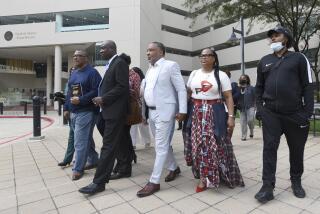Blood Feud : Man With ‘Rare Properties’ Fights for a Share of Any Medical Profits
- Share via
In an unprecedented case, a California court of appeal was asked Tuesday to consider whether a patient’s rights extend to commercial profits on products genetically engineered from his blood or tissues.
John Moore, 43, a Seattle sales manager, filed the case more than three years ago after he was successfully treated for leukemia at UCLA Medical Center. Researchers found that his blood contained rare properties that offered some protection against the disease and that they hope eventually can be used to treat cancer and acquired immune deficiency syndrome.
Moore claimed that the university and hematologist-oncologist Dr. David W. Golde wrongly obtained a patent on a cell line developed from his blood, without obtaining his consent, discussing the potential commercial value or offering to share future profits with him. A cell line is a culture of cells with uniform characteristics.
Although the university and Golde claim the cell line has so far reaped no monetary rewards and is used only for research, Moore’s attorney, Sanford M. Gage, estimates the potential value of the product “in the billions of dollars.”
Los Angeles Superior Court Judge Warren Deering dismissed the civil suit two years ago, saying Moore had not shown that the doctors knowingly converted his blood and tissue to their own profitable use.
Tuesday, Justices Arleigh M. Woods and Ronald M. George, joined by Los Angeles Superior Court Judge David M. Rothman sitting by special appointment on the Los Angeles-based 2nd District Court of Appeal, were asked to reinstate the case so that it can proceed to trial.
Heated Arguments
Gage, leading off 90 minutes of heated arguments frequently punctuated by questions from the justices, said the case’s fundamental issue is “protection of the patient from clandestine research by the physician and the physician’s secret commercial partners who exploit the patient for profit.”
Gage argued that a patient has a “property interest” in his blood and that it cannot be taken from him and essentially sold without his permission.
Moore consented to removal of his spleen Oct. 20, 1976, which is considered common therapy for leukemia, Gage said, but was given no consent forms when blood was taken periodically over the next seven years. Gage maintains that the potentially lucrative cell line was created from Moore’s blood with its “unique qualities, unique properties and unique compounds.”
Anthony Murray, Golde’s attorney, and Alan Wagner, attorney for the UC Board of Regents, countered that Golde had developed the cell line from blood in Moore’s discarded spleen and not from blood removed later for therapeutic tests. When patients consent to removal of organs, the lawyers contended, they also consent to the organs’ disposal or use for research.
“The patent says it (the cell line) came from the spleen. The complaint (suit) says Dr. Golde used the spleen and the blood drawn subsequently. That is a factual dispute,” pointed out Judge Rothman, indicating a willingness to reinstate the case for trial of the competing claims.
“This is not something that grows like a weed,” Murray said. “We distinguish between the cell which came out of the patient and was infected with cancer and the cell line which was developed in the laboratory from the cell. . . . This is genetic engineering, using the DNA from the cell, but creating a completely different thing.”
Moore, the doctor’s lawyers argued, has no property rights to that “different thing” created by Golde and his assistants.
Concerned by Wagner’s claims that acknowledging Moore’s rights to the cell line could hamstring university research by allowing patients to bargain for profits, Justice George pointedly asked how much of a precedent the one case could set.
‘Special Properties’
“This has precedential value only where the facts in other cases are like these,” said Gage’s co-counsel, Jonathan T. Zackey. “This is unlike research with 3,000 pituitary glands. This case involves one unique individual with special properties in his blood.”
The justices have several weeks in which to issue their written decision.
Defendants other than the UC Regents and Golde, are researcher Shirley G. Quan, Genetics Institute Inc. and Sandoz Pharmaceuticals Corp.
More to Read
Sign up for Essential California
The most important California stories and recommendations in your inbox every morning.
You may occasionally receive promotional content from the Los Angeles Times.













